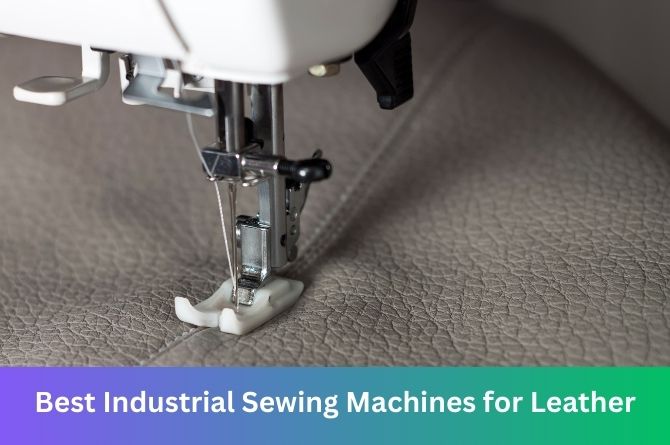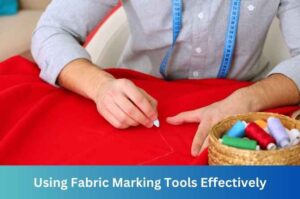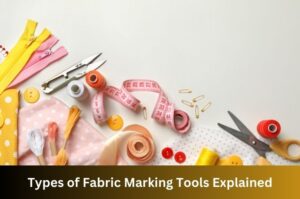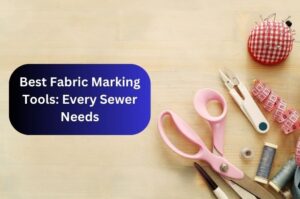When it comes to working with leather, the right tools can make all the difference. Leather, known for its durability and flexibility, requires a machine that can handle its unique challenges.
Selecting the best industrial sewing machine for leather isn’t just about finding a machine that works—it’s about finding one that enhances your craft, increases productivity, and ensures the quality of your projects.
This guide is designed to help you navigate the complex landscape of industrial sewing machines, focusing on the features and options that matter most for leatherworking.
Topics Analyzed
Why Choose an Industrial Sewing Machine for Leather?
Durability and Strength
Leather is a tough material, and stitching through it requires a machine with considerable power and durability. Unlike fabrics like cotton or silk, leather demands a robust sewing machine that can handle its thickness without skipping stitches or breaking needles.
Industrial sewing machines are specifically designed for heavy-duty tasks, making them the ideal choice for leatherwork. These machines are built with stronger components, such as a heavy-duty motor and metal gears, which provide the necessary force to sew through multiple layers of leather effortlessly.
Precision and Speed
Precision is crucial when sewing leather. A small mistake, such as a crooked stitch or uneven tension, can ruin the entire piece. Industrial sewing machines are known for their high level of precision, ensuring that every stitch is consistent and accurate.
Moreover, these machines operate at higher speeds than domestic models, allowing you to complete projects more quickly without compromising quality.
This is especially important for professionals who need to maintain a high production rate, such as those involved in “Automotive Upholstery” or crafting leather goods for sale.
Versatility
Leather comes in various types, thicknesses, and finishes, each requiring different stitching techniques. An industrial sewing machine designed for leather is versatile enough to handle everything from soft, pliable lambskin to thick, rugged cowhide.
Whether you’re working on “Sewing Machine for Quilting,” “Industrial Sewing Machines for Denim,” or heavy leather jackets, these machines can adapt to your needs, making them a valuable asset for any leatherworker.
Long-Term Investment
Investing in a quality industrial sewing machine is a smart decision for anyone serious about leatherworking. While these machines may come with a higher upfront cost, they are built to last.
With proper maintenance, an industrial sewing machine can serve you for decades, providing a reliable tool for all your leather projects. The durability and performance of these machines make them a worthwhile investment for both hobbyists and professionals.
Key Features to Consider When Buying an Industrial Sewing Machine for Leather
Choosing the best industrial sewing machine for leather involves understanding the key features that will affect your sewing experience and the quality of your work.
Motor Power and Type
The motor is the heart of any sewing machine, and when it comes to leather, more power is always better. Industrial sewing machines typically come with either a clutch motor or a servo motor.
A clutch motor offers high speed and power, making it ideal for heavy-duty tasks like sewing thick leather. However, it can be noisy and less energy-efficient.
On the other hand, a servo motor is quieter, more energy-efficient, and provides more control over speed, making it suitable for detailed leatherwork.
Stitching Speed
Stitching speed is an important factor, especially for professionals who need to produce a high volume of work. Industrial sewing machines can achieve much higher speeds than domestic machines, often exceeding 5,000 stitches per minute.
However, when working with leather, it’s crucial to have a machine that allows you to adjust the speed. Slower speeds are often necessary for intricate stitching or working with thicker materials, while higher speeds can be used for simpler, straight seams.
Needle System
The needle system of your sewing machine is critical when working with leather. Leather needles have a different design compared to regular needles, featuring a cutting point that allows them to pierce through tough materials without tearing.
Industrial machines often come with specialized needle systems that accommodate a wide range of needle sizes and types. This versatility is essential for working with different types of leather and achieving the desired stitch quality.
Throat Space
Throat space, or the distance between the needle and the body of the machine, is a crucial feature for leatherworkers. Larger throat space allows you to handle bigger pieces of leather and maneuver them more easily.
This is especially important when working on large projects like “Automotive Upholstery” or crafting leather garments. A machine with ample throat space will give you the freedom to work on a variety of projects without feeling restricted.
Feed Mechanism
The feed mechanism determines how the fabric moves through the machine. For leather, a walking foot, needle feed, or compound feed mechanism is often the best choice.
A walking foot mechanism, for example, moves both the top and bottom layers of leather together, preventing slipping and ensuring even stitching.
This is particularly useful for working with multiple layers of leather, as it helps maintain consistent stitch length and prevents puckering.
Presser Foot
The “Presser Foot” is another essential component to consider. A good presser foot should be adjustable to accommodate the varying thicknesses of leather you’ll be working with.
Industrial sewing machines often come with specialized presser feet designed for leather, such as roller feet or Teflon-coated feet, which reduce friction and help the material glide smoothly under the needle.
An adjustable presser foot is crucial for achieving consistent stitch quality, especially when working with thick or sticky leathers.
Durability and Build Quality
Industrial sewing machines are known for their durability and build quality. When choosing a machine for leather, look for one that is constructed with high-quality materials, such as metal gears and a sturdy frame.
This ensures that the machine can withstand the rigors of leatherworking and provide years of reliable service. A well-built machine will also require less maintenance and fewer repairs over its lifespan, saving you time and money in the long run.
Ease of Use and Maintenance
While industrial sewing machines are designed for professionals, they should still be user-friendly. Features such as easy threading, straightforward controls, and clear instructions can make a big difference, especially for those new to leatherworking.
Additionally, consider the ease of maintenance. Machines that are easy to clean, oil, and service will help you keep them in top condition and extend their lifespan.
Regular maintenance is key to ensuring consistent performance, especially when working with demanding materials like leather.
Overview of Selection Criteria
Our selection criteria focused on several key factors, including motor power, stitching speed, needle system, and overall build quality.
We also considered customer feedback and expert reviews to ensure that each machine delivers on its promises and provides excellent value for money.
Top 7 Industrial Sewing Machines for Leather
To help you find the best industrial sewing machine for your leather projects, we’ve reviewed seven of the top models on the market. These machines have been selected based on their power, durability, ease of use, and customer reviews.
JUKI DU-1181N
Why Buy This Product?
The JUKI DU-1181N is an excellent choice for professionals who work with leather regularly. Its high-speed capability of 2,000 stitches per minute and robust walking foot mechanism make it ideal for medium to heavy leather projects.
This machine offers precision and durability, ensuring consistent stitch quality even on challenging materials like leather.
Key Features
- High-speed sewing at 2,000 stitches per minute
- Walking foot mechanism for smooth feeding of leather
- Heavy-duty construction for long-lasting performance
- Adjustable presser foot for handling different material thicknesses
Pros
- Exceptional performance on medium to heavy leather
- High-speed operation increases productivity
- Durable construction suited for professional use
Cons
- The machine is quite heavy, making it less portable
- It may be overkill for hobbyists or light-duty users
Customer Reviews
Customers highly appreciate the machine’s ability to handle thick leather without skipping stitches, making it a favorite among professional leatherworkers.
Singer Heavy Duty 4423
Why Buy This Product?
The Singer Heavy Duty 4423 is perfect for those who need a powerful and versatile machine for various sewing projects, including leather.
Its 60% stronger motor and ability to sew up to 1,100 stitches per minute make it ideal for both beginners and experienced sewers who work with heavy fabrics.
Key Features
- 23 built-in stitches including basic, stretch, and decorative stitches
- Strong motor capable of sewing thick materials like leather
- Adjustable stitch length and width
- Includes multiple accessories such as zipper foot, buttonhole foot, and more
Pros
- Powerful motor handles thick materials with ease
- Versatile stitch options
- Affordable price for a heavy-duty machine
- Comes with a 25-year limited warranty
Cons
- The wide range of features may be overwhelming for beginners
- Some users report that the machine can be noisy at high speeds
Customer Reviews
Users often commend the 4423 for its power and reliability, particularly when working with thick fabrics like leather. Its affordability and ease of use make it a popular choice for both novices and seasoned sewers.
Brother ST371HD
Why Buy This Product?
The Brother ST371HD is a versatile and affordable option for those who need a machine capable of handling tough materials like leather.
With its metal needle plate and non-stick foot, this machine ensures smooth and precise stitching on leather and other heavy fabrics.
Key Features
- 37 built-in stitches for versatility
- Metal needle plate for durability
- Non-stick foot for smooth feeding of leather
- Free arm for sewing cuffs and sleeves
Pros
- Sturdy construction designed for heavy fabrics
- Affordable price
- Easy to use, even for beginners
- 25-year limited warranty and free technical support
Cons
- Occasional reports of mediocre sewing performance on lighter fabrics
- Limited to basic stitch options compared to more advanced machines
Customer Reviews
Customers appreciate the Brother ST371HD for its durability and ease of use, particularly when working with tough materials.
It’s a solid choice for those who need a reliable machine for both leather and other heavy fabrics.
Singer Heavy Duty 4411
Why Buy This Product?
The Singer Heavy Duty 4411 is an excellent budget-friendly option for those who need a machine that can handle leather without breaking the bank.
With its strong motor and simple design, this machine is ideal for beginners and those who need a reliable workhorse for heavy-duty sewing.
Key Features
- 11 built-in stitches for basic sewing needs
- Strong motor that is 60% more powerful than standard sewing machines
- Adjustable stitch length and width
- Metal frame for durability
Pros
- Affordable price point
- Strong motor capable of handling thick leather
- Simple, user-friendly design
- Durable construction
Cons
- Limited stitch options compared to more advanced machines
- No walking foot included, which is essential for leatherwork
Customer Reviews
Users love the Singer 4411 for its power and simplicity, making it a great choice for those who need a basic yet strong machine for leather projects. Its affordability is also a significant selling point
Consew 206RB-5
Why Buy This Product?
The Consew 206RB-5 is a top-tier industrial machine designed for professionals who require a reliable and powerful machine for leatherwork. Its triple-feed walking foot ensures smooth and consistent stitching on even the toughest materials, making it a favorite among serious leatherworkers.
Key Features
- Triple-feed walking foot for smooth fabric feeding
- High-speed operation for increased productivity
- Adjustable stitch length and reverse stitch mechanism
- Heavy-duty construction for durability
Pros
- Exceptional performance on thick and bulky materials
- Precise stitching with the triple-feed system
- Built to last with durable construction
- Suitable for professional use
Cons
- High price point may be prohibitive for some users
- The machine is quite heavy and not easily portable
Customer Reviews
Customers consistently praise the Consew 206RB-5 for its powerful performance and ability to handle thick leather with ease. It’s considered a reliable investment for professionals who need a durable and precise machine.
Janome HD3000
Why Buy This Product?
The Janome HD3000 is perfect for those who need a sturdy and reliable machine for leather and other heavy fabrics.
With its powerful motor, adjustable presser foot, and included walking foot, this machine is well-equipped to handle a variety of leather projects.
Key Features
- 18 built-in stitches for various sewing tasks
- Adjustable presser foot pressure for different fabric thicknesses
- Included walking foot for leatherwork
- Heavy-duty metal frame for durability
Pros
- Reliable performance on leather and other heavy fabrics
- Easy to use, even for beginners
- Quiet operation
- Includes necessary accessories for leatherwork
Cons
- May struggle with very thick leather
- Limited stitch options compared to more advanced models
Customer Reviews
Customers appreciate the Janome HD3000 for its reliability and ease of use. It’s a great option for those who need a dependable machine for occasional leather projects without investing in a more expensive industrial machine.
Brother CS6000i
Why Buy This Product?
The Brother CS6000i offers a great balance between affordability and functionality, making it a solid choice for those who need a versatile machine that can handle leather as well as lighter fabrics.
Its computerized features and variety of stitch options make it suitable for both beginners and more experienced sewers.
Key Features
- 60 built-in stitches, including decorative and buttonhole stitches
- Computerized functionality for ease of use
- Free arm and extended table for larger projects
- LCD display for easy stitch selection
Pros
- Versatile and user-friendly
- Quiet performance
- Affordable price
- Ideal for both heavy and light fabrics
Cons
- Some users find the automatic threader difficult to use
- Less powerful compared to other heavy-duty machines
Customer Reviews
Users appreciate the Brother CS6000i for its versatility and ease of use. It’s particularly popular among beginners who want a machine that can handle a wide range of projects, including light leatherwork.
Frequently Asked Questions (FAQs)
What type of motor is best for sewing leather?
A motor with high power, such as a clutch motor or a servo motor, is best for sewing leather. A clutch motor offers more speed and power, making it ideal for heavy-duty tasks, while a servo motor provides better control and energy efficiency, which is beneficial for detailed work.
Can a regular sewing machine be used for leather?
While a regular sewing machine can handle some light leatherwork, it is not ideal for thick or tough leather. Industrial sewing machines are specifically designed for heavy materials like leather and offer the power, durability, and precision needed for high-quality stitching.
How often should I service my industrial sewing machine?
Regular maintenance is crucial to keep your industrial sewing machine in top condition. It’s recommended to service your machine every six months to a year, depending on how frequently you use it. Regular cleaning, lubrication, and inspection of key components will help prevent issues and ensure smooth operation.
What is the best thread to use for leather?
For leatherwork, it’s important to use strong, durable thread such as “Overlock Thread” or heavy-duty nylon or polyester thread. These threads are designed to withstand the tension and friction of sewing leather, ensuring that your stitches hold up over time.
How do I avoid skipped stitches when sewing leather?
To avoid skipped stitches, use the correct needle for leather, such as a leather point needle, and ensure it’s properly installed. Adjust the tension and stitch length to suit the thickness of the leather. Also, consider using a machine with a walking foot or compound feed mechanism to ensure even stitching.
Final Thoughts
Choosing the best industrial sewing machine for leather is a critical decision that can impact the quality of your work and your overall experience as a leatherworker. Whether you’re a hobbyist or a professional, investing in a reliable, powerful, and versatile machine is essential.
By considering the features and models discussed in this guide, you can find the perfect machine to meet your needs and take your leather projects to the next level.
Remember to consider your specific needs, such as the type of leather you’ll be working with, the size of your projects, and your budget. With the right machine, you’ll be able to produce high-quality leather goods that showcase your craftsmanship and creativity.




